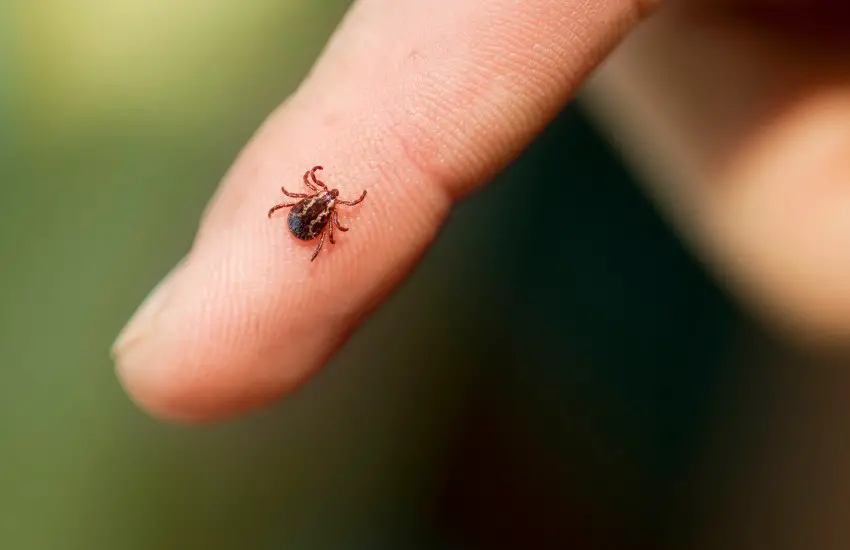Can Dawn Dish Soap Kill Ticks? (Myth Or Fact: Debunked)

Ticks can be a real problem for both pets and people. Not only are they irritating and itchy, but they can also carry dangerous diseases like Lyme disease. There are many different methods for getting rid of ticks, but one that has been circulating for years is using Dawn dish soap. The idea is that the soap will suffocate and kill the ticks, but does it really work? In this article, we’ll take a closer look at the effectiveness of using Dawn dish soap to kill ticks and answer some of the most common questions about this method. Whether you’re dealing with a tick infestation or just looking for a preventative measure, keep reading to learn more.
Quick Links
Can Dawn Dish Soap Kill Ticks? Exploring the Effectiveness of This Method
Dawn dish soap has been touted as a simple, inexpensive solution for removing ticks from pets and humans. The idea is that the soap loosens the tick’s grip on the skin, making it easier to remove. But does this method actually work? Unfortunately, there is no scientific evidence to support the effectiveness of Dawn dish soap on ticks.
In fact, Livingston County officials in New York warn against applying anything to a tick prior to removal, as it may make the tick release more bacteria into the host’s bloodstream. So, while using Dawn dish soap may seem like a quick fix, it’s important to proceed with caution when dealing with ticks.
When it comes to removing ticks, the Centers for Disease Control and Prevention (CDC) recommends using a pair of fine-tipped tweezers to grasp the tick as close to the skin’s surface as possible and pulling upward with steady, even pressure.
It’s important to avoid squeezing the tick’s body or twisting the tick, as this can cause the mouthparts to break off and remain in the skin. After removing the tick, it’s a good idea to clean the bite area with rubbing alcohol or soap and water.
Additionally, it’s important to monitor the bite site for any signs of infection, such as redness, swelling, or a bullseye rash, and seek medical attention if necessary.
Overall, while Dawn dish soap may seem like a convenient solution for tick removal, it’s best to stick with the tried-and-true method of using tweezers to remove ticks safely and effectively.
Is Dawn Dish Soap Safe for Removing Ticks On Pets?
While Dawn dish soap may (or may not) be effective at removing ticks and other pests, it’s important to consider whether it’s safe to use on your furry friends. So there’s been some back and forth on whether it’s actually safe or not. According to Risius Family Vet in Iowa, Dawn dish shop is not safe to use as it can lead to skin infections.
According to them, using Dawn dish soap on pets can strip their skin and coat of natural oils, leading to dryness, flakiness, and irritation. Additionally, the soap’s ingredients may be too harsh for some pets, particularly those with sensitive skin or allergies. Ingesting Dawn dish soap can also be harmful to pets, as it may cause gastrointestinal upset or even chemical burns.
If you do decide to use Dawn dish soap anyway on your pet, it’s important to take precautions to minimize the risks. First, make sure to dilute the soap with water and use only a small amount. Rinse your pet thoroughly after washing to remove all traces of the soap. It’s also a good idea to monitor your pet for any signs of skin irritation or other adverse reactions. If you notice any redness, itching, or discomfort, stop using the soap immediately and consult your veterinarian for guidance on alternative options for pest control.
Can Dawn Dish Soap Kill Tick Eggs?
To understand whether Dawn dish soap can kill tick eggs, it’s important to first understand the tick egg life cycle. Female ticks lay their eggs in the environment, usually in areas with tall grass or leaf litter. The eggs hatch into larvae, which then feed on small animals before molting them into nymphs. Nymphs then feed on larger animals before molting into adult ticks, completing the life cycle.
While Dawn dish soap has been touted as a tick removal option, there is no research to suggest it can kill tick eggs. In fact, tick eggs are highly resilient and can survive in the environment for months, even in harsh conditions. Additionally, many tick-killing products on the market are not even effective at killing tick eggs.
If you’re concerned about tick eggs in your home, there are other methods you can use to reduce the tick population. Keeping your lawn mowed and free of debris can help to remove tick habitat. Applying insecticides specifically designed for ticks can also be effective at reducing the tick population. It’s important to follow the instructions carefully and use caution when applying any chemical products in or near your home. We’ll touch on this more in the next section.
How to Prevent Tick Infestations
Preventing tick infestations is important for protecting both yourself and your pets from tick-borne diseases like Lyme disease. Here are some tips for preventing ticks from entering your home and ways to protect yourself and your pets from tick bites:
- Keep your lawn mowed and free of debris: Ticks thrive in tall grass and leaf litter, so keeping your lawn well-manicured can help to reduce the tick population near your home.
- Use tick repellents: Repellents containing DEET, permethrin, or picaridin can be effective at repelling ticks. It’s important to follow the instructions carefully and avoid applying these products directly to your skin.
- Wear protective clothing: When spending time outdoors, wear long sleeves and pants to reduce the amount of exposed skin. Tucking your pants into your socks and wearing a hat can also help to prevent ticks from crawling onto your skin. But just keep in mind, that ticks can also latch on to your clothes and survive.
- Check for ticks regularly: After spending time outdoors, check yourself and your pets for ticks. Ticks can attach to your skin for up to 48 hours before transmitting diseases, so prompt removal is important.
- Use natural tick repellents: In addition to chemical repellents, there are also natural options that can help to repel ticks. Essential oils like eucalyptus, lavender, and peppermint can be effective at repelling ticks, but it’s important to dilute them properly and use caution when applying them to your skin
By taking these precautions, you can help to reduce the risk of tick infestations and protect yourself and your pets from tick-borne diseases.
Conclusion
While Dawn dish soap may not be the most effective method for preventing tick infestations, it’s still important to take steps to protect yourself and your pets from tick bites. Ticks can transmit a variety of diseases, including Lyme disease, so it’s important to be vigilant when spending time outdoors. By following the tips outlined above, you can reduce your risk of tick bites and keep your home and yard tick-free. Remember to check yourself and your pets for ticks regularly, and seek professional help if you notice an infestation. With a little effort, you can enjoy spending time outdoors (without the worry of tick-borne diseases.)






